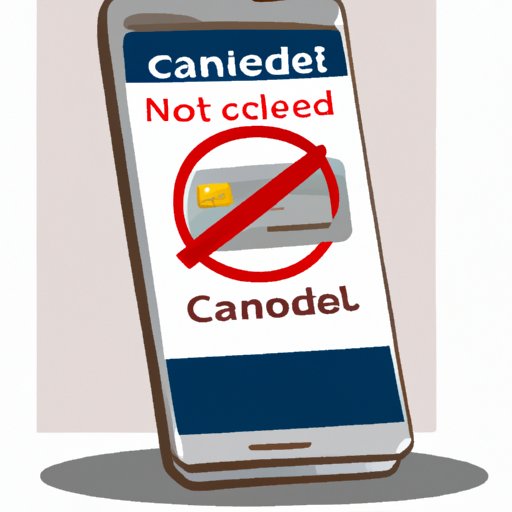
Introduction
Credit cards can be a convenient tool for making purchases, but sometimes circumstances change, and you need to cancel the card. Perhaps you’ve found a better card, or maybe you’ve decided to simplify your finances and reduce your debt. Whatever your reason, it’s important to know how to cancel your credit card correctly. In this article, we provide a step-by-step guide to assist you in canceling your card without complications.
Step by Step Guide
Before canceling your credit card, it’s essential to pay off outstanding balances. Failing to do so can negatively affect your credit score and result in late fees and penalties. Once you’ve cleared any balances, contact your bank to inform them of your intention to cancel your credit card. Most banks offer different channels for canceling, so it’s essential to choose the best one for your situation.
If your card issuer has a physical branch near you, you may want to consider visiting it in person. Alternatively, you can call the customer service number on the back of your credit card. Be sure to have your credit card handy, as the bank representative may request the number and other information. They may also ask the reason for canceling your card, but this isn’t compulsory.
Once you’ve informed the bank representative, be sure to confirm all details about your outstanding balance, including when and how to pay it back. Additionally, request an email or letter confirmation of your credit card cancellation. This documentation can help you avoid misunderstandings, errors, or fraudulent transactions.
Phone-Based Cancellation
Banking has become easier with phone-based services. You can opt to cancel your credit card via your bank’s phone-based services instead of going to a branch. Phone-based services are often available 24/7 and may be more convenient than visiting a branch.
To utilize phone-based cancellation services, find the appropriate customer service number and call it. Expect to navigate through a series of menus and prompts that will lead you to the appropriate option. Pay attention to any balances or other details the bank representative might request. In conclusion, you’ll still need to pay off outstanding balances before cancellation and receive confirmation of cancellation.
One potential drawback of phone-based cancellation is that you may not get confirmation in writing about the transaction’s completion. Therefore, you must keep notes or record the call and ask the representative to send an email or letter confirmation with the necessary details.
Online Cancellation
If you use online banking, you can also opt to cancel your credit card this way. This might sound straightforward, but online transactions can have security risks. Therefore, it’s important to ensure you’re on a secure browser, particularly if you’re using a public network.
To cancel your credit card online, log in to your bank account, go to the credit card section, and choose the cancellation option. Follow the prompts and input the required details carefully. Like other methods of cancellation, you must ensure that you pay off any outstanding balances and request an email or letter confirmation of cancellation.
Personal Experiences
When canceling a credit card, you may encounter unexpected challenges. Personal experiences can assist in illustrating some of the challenges and how others address them. One common difficulty is navigating through various menus on phone-based cancellation services. Some suggested that repeating “agent” or “speak to a representative” led to faster connections to representatives who helped them cancel their card. Others have reported extended hold times and receiving incorrect information from customer service representatives.
Regarding online cancellation, some people have struggled with a non-intuitive user interface or finding the cancellation option. Others lacked access to computers or the internet, making it challenging to cancel their credit cards online.
Despite these challenges, people have succeeded in canceling their credit cards. They resolved issues by being persistent and advocating for themselves.
Highlighting Alternatives
When it comes to credit card cancellation, it’s important to consider all available alternatives. Instead of canceling entirely, you could choose to downgrade your card to a lower interest rate or a card with no annual fee. You could also transfer your balance to another card that offers more favorable terms or an introductory interest-free period.
One downside with alternatives is that they may come with administrative fees or have a limited duration. For example, transferring balances to a new card with lower interest rates may come with a transfer fee. Additionally, it’s vital to consider your spending habits to ensure you don’t fall into the same debt pattern again.
Credit Card Companies Policies
Different credit card companies handle cancellation differently. Some may issue refunds or credits for annual fees, while others may charge cancellation fees or penalties. Before canceling your card, review the terms and conditions to be aware of any potential consequences.
Additionally, make sure you understand how credit card cancellation can impact your credit score. Canceling a credit card with a long credit history can lower your overall credit score, as long credit histories are a positive factor in credit scoring.
Conclusion
Canceling a credit card might seem daunting, but with the right knowledge, it can be a straightforward process. We have discussed the major techniques for canceling credit cards, including phone-based and online methods, and presented alternative options for readers to consider. We have also highlighted personal experiences that serve as a reminder to persevere until any challenges get resolved. It’s essential to pay off all outstanding balances before canceling a credit card and getting confirmation of cancellation from your bank. Cancelling a credit card can have serious consequences, so ensure that you understand your credit card’s terms and policies before taking action.
It’s important to remind readers that canceling a credit card is a decision that requires thoughtful consideration. It’s essential to research alternative options and the credit card companies’ policies and weigh up any benefits or disadvantages before making a decision.




